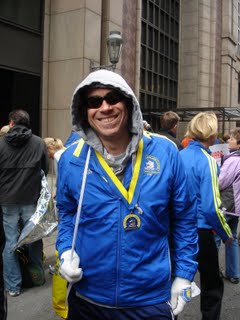
Two weeks ago Lance Godard posed this question to me in Blawg Review #257:
You’re an active Web 2.0 participant. What specific impact on business, if any, have you seen from your online activities?
Since it’s a question I’ve heard a hundred times before it must be a reasonable one, and one worth discussing.
The answer, however, is impossible to quantify, and this is why: When potential clients I ask them how they got my name. I’m required to ask because, if I take a new matter, I must report that piece of information to the Office of Court Administration.
But what if the answer is, as often happens, an embarrassed “web” or “Internet” or “computer,” then what? It’s possible that they hit my website, a Google ad that I sometimes run, or that they stumbled on this blog. Or its possible that a friend or relative found me one of those ways and then passed the information on.
Which site they hit first is the type of question a marketer would want to have answered. And in theory a lawyer could try to find out which one by asking all manner of follow-up questions while the subject was fresh in the caller’s mind.
But I never ask. Because the answer is completely irrelevant to any issue that the caller has. They called because Mom’s cancer wasn’t diagnosed in time or little Johnny was hit by a car. They didn’t call to talk about marketing, web ads, blogs or any of that other stuff. They called because they have a problem. That which may be interesting to marketers isn’t interesting to the potential client.
And if it isn’t interesting to the client or relevant to any issue that they have, then it doesn’t matter to me. The moment when someone is distraught over a family member in the hospital is no time to satisfy an idle intellectual curiosity.
The reality is that, before I had this blog, I already had a number of people find me due to my website, which is pretty extensive. That wasn’t the primary way, of course, because I received referrals from former clients and lawyers that knew me.
The calls that come from “the web” tend to be cases I’m less likely to take. That’s because the calls haven’t been screened by someone else that knows me. Many of the web callers have previously been rejected by others, a conclusion that is generally pretty easy to divine within moments of the call starting.
There are, in other words, way too many variables for me to figure out what exact effect this blog has. The only time I know for sure is when attorneys that find this blog call me, as they will introduce themselves that way. Lawyers can be dispassionate about legal issues and chat for a moment or two before getting to the reason for the call. Potential clients, on the other hand, want to talk immediately about the incident.
So if it’s impossible to determine what effect a blog might have on marketing, why spend so much time on it? And the answer is easy; because I enjoy it. No one should blog if they don’t find the actual activity rewarding for itself, for it is immediately apparent from the writing if the person is doing it simply to game Google for clients, as opposed to writing for enjoyment.
When lawyers who enjoy the medium blog, you see personality. You see passion. You see opinions. You see people interviewing George Bush’s dog after he bit someone. You see stuff that they don’t teach in law school, and they don’t teach in marketing school.
Sis months ago Scott Greenfield wrote, regarding all the law bloggers coming to town:
Most new blogs are doomed to death from the outset, created for the wrong reason and certain to fail to achieve their creator’s purpose. Most offer neither insight nor viewpoint, as their creators are scared to death that taking a firm and clear position might offend a reader, a potential client. After all, the vast majority of blogs are born solely as a marketing vehicle, even if the creators follow the sound advice not to make them look too “markety.”
….
The barrier to entry into the blawgosphere has increased dramatically. It’s not one of cost, or concept, as much as one of merit, focus and purpose. If you have the desire to write, the guts to write something worth reading and the stomach to deal with the constant onslaught of stupid and crazy readers, there’s a place for you in the blawgosphere. If you think it’s the path to success in your law practice, you will be sorry and your blog will fail.
…..
When I did a CLE with Kevin [O’Keefe], who was busily promoting blogging as the way to expose lawyer to the world, I responded to his enthusiasm with a caution: Anyone can have a blawg. Everyone cannot.
Thus comes Greenfield’s Law: Everyone can blog, but not everyone should. Because if you aren’t enjoying it, it will show.
So the answer to the question — What specific impact on business, if any, have you see from your online activities? — is this: I have no idea, though I know that there are many lawyers around the country that now know who I am, and that the fun I have in writing in this tiny corner of cyberspace has raised my general profile. That is a form of indirect marketing that I discussed last year, and can also result, for example, in a law blogger being quoted in the paper if they can talk authoritatively on a subject.
But that type of general profile-raising isn’t the kind of “specific impact” that can be quantified anymore than one can quantify the effect of writing an op-ed for the local paper or law magazine.




